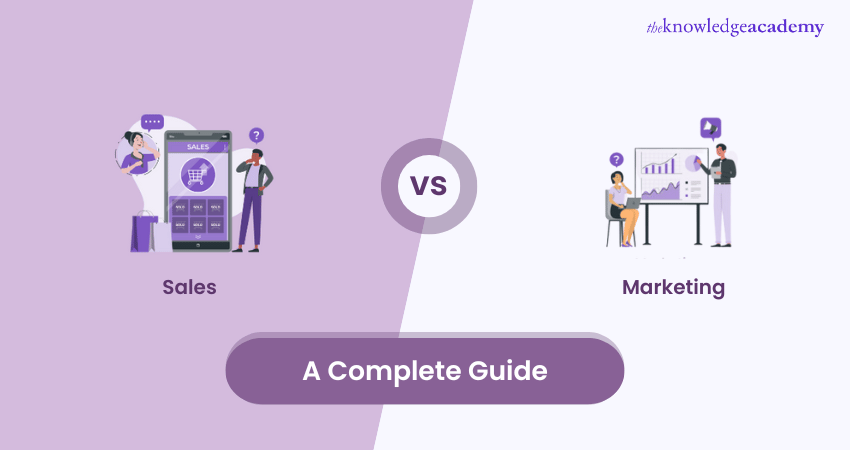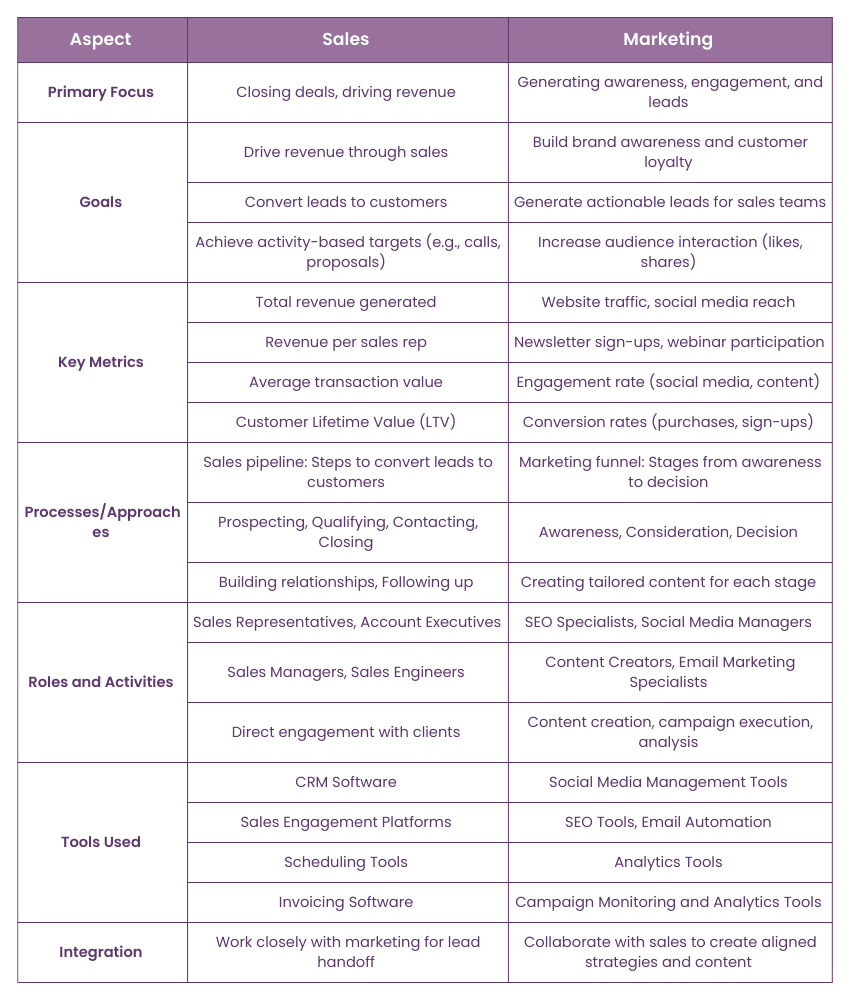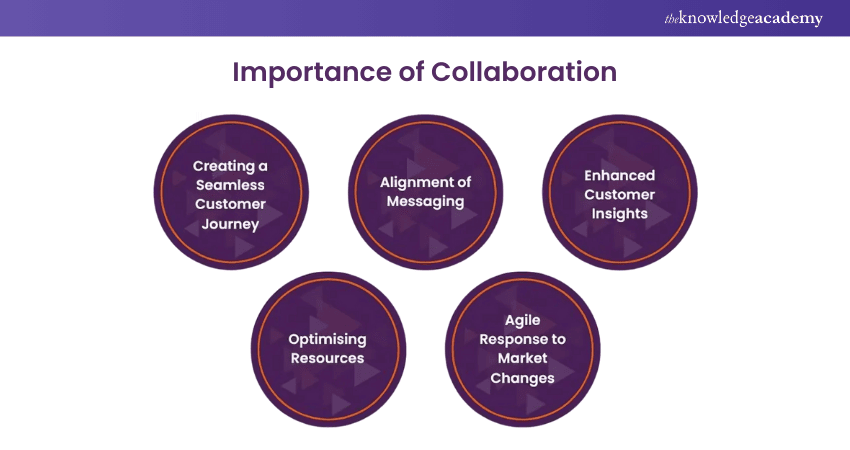We may not have the course you’re looking for. If you enquire or give us a call on +44 1344 203 999 and speak to our training experts, we may still be able to help with your training requirements.
We ensure quality, budget-alignment, and timely delivery by our expert instructors.

Sales and marketing are often seen as two sides of the same coin, but they play distinct roles within an organisation. Both are essential for driving revenue, yet their goals, strategies, and metrics vary significantly. Grasping the Difference Between Sales and Marketing is vital for any business aiming to succeed.
Marketing is all about creating buzz and generating interest in a product or service. It involves crafting compelling messages, building a strong brand identity, and attracting potential customers. Sales, on the other hand, focuses on directly engaging with these prospects, addressing their needs, and turning interest into actual transactions.
This blog will delve into the Difference Between Sales and Marketing, explore how they interact, and offer insights on optimising both for maximum impact. Let’s uncover the unique roles they play and how they can work together to drive your business forward.
Table of Contents
1) What is Sales?
2) What is Marketing?
3) Difference Between Marketing and Sales
4) Skills for Salespeople
5) Skills for Marketers
6) Importance of Collaboration
7) Is Sales and Marketing a Difficult Job?
8) Which is More Important, Marketing or Selling?
9) Conclusion
What is Sales?
Sales is the method of converting potential customers into actual buyers by persuading them to purchase a product or service. It involves direct interaction with prospective customers to address their specific needs, answer questions, and close deals.
Sales professionals focus on building relationships, negotiating terms, and ensuring customer satisfaction to foster long-term loyalty. Ultimately, sales aim to generate revenue for a business by turning leads or prospects into paying customers.
Goals of Sales
Sales efforts are guided by specific goals, including:
a) Closing Deals: Converting potential leads into paying customers by guiding them from interest to purchase.
b) Revenue Generation: Driving the financial health of the organisation by successfully closing deals.
c) Meeting Targets: Working towards predetermined quotas or targets, which serve as benchmarks for performance.
d) Customer Relationship Building: Establishing trust and credibility by addressing customer needs, handling objections, and offering tailored solutions.
What is Marketing?
Marketing is the broader strategy of promoting and communicating the value of a product or service to attract and engage potential customers. It includes activities such as market research, branding, advertising, and content creation to build awareness and generate interest.
The goal of marketing is to build demand by identifying the target audience’s needs and positioning the product or service as the solution. Effective marketing sets the stage for sales by driving traffic, generating leads, and establishing a strong brand presence.
Difference Between Marketing and Sales
Sales and marketing may appear as separate departments, but they are deeply intertwined in driving a business’s success. Here’s a fresh look at what sets them apart and how they work together.

Sales and Marketing Goals
Here’s how sales and marketing set their sights on success with distinct objectives that drive growth and performance:
Sales Goals
Sales teams aim to drive revenue by closing deals and converting leads into customers. Their performance is measured using metrics like:
a) Total revenue generated within a specific period.
b) Revenue contributed by individual sales representatives.
c) Average transaction value.
d) Customer Lifetime Value (LTV), representing the total revenue expected from a single customer.
Sales teams often break these goals into activity-based targets, such as the number of client calls, email follow-ups, or proposals sent. These smaller, actionable goals keep the team aligned with their revenue objectives.
Marketing Goals
Marketing teams focus on generating awareness, engagement, and leads to support the sales process. Their goals typically align with the following:
a) Awareness: Increasing brand visibility through website traffic, social media reach, and content distribution.
b) Engagement: Encouraging audience interaction via social media likes, shares, comments, and content consumption.
c) Conversion: Generating actionable outcomes such as newsletter sign-ups, webinar participation, or product purchases.
d) Retention: Sustaining relationships with existing customers through ongoing engagement and loyalty initiatives.
Processes, Sales Pipelines and Marketing Funnels
Here’s how sales pipelines and marketing funnels map the journey from prospect to customer, each with distinct stages and strategies:
Sales Pipelines
Sales pipelines track the journey of potential customers through the sales process, providing a structured approach to converting leads into paying clients. Common stages include:
a) Prospecting: Identifying potential leads
b) Qualifying: Assessing lead quality and potential
c) Contacting: Initiating communication
d) Building Relationships: Nurturing trust and understanding client needs
e) Closing: Securing a deal or sale
f) Following up: Re-engaging leads that have gone cold
Sales pipelines focus on activity-based actions at each stage to move prospects closer to conversion.
Marketing Funnels
Marketing funnels represent the customer journey from awareness to decision-making, focusing on nurturing prospects through various stages:
a) Awareness: Prospects become aware of their problem or needs
b) Consideration: They explore solutions to address their challenge
c) Decision: They evaluate options and make a purchase decision
Marketing teams create tailored content and campaigns for each stage, ensuring prospects receive the right information to guide their decision-making process.
Sales and Marketing Roles and Day-to-day Tasks
Here’s a look at the unique responsibilities and daily activities that define sales and marketing teams:
Sales Roles and Activities
Sales teams engage directly with prospects and customers, focusing on closing deals and building relationships. Typical roles include:
a) Sales Representatives
b) Account Executives
c) Sales Managers
d) Sales Engineers
Daily activities involve tracking progress in CRM systems, making calls, sending follow-ups, and preparing proposals. Sales professionals work to meet specific quotas and ensure customer satisfaction.
Marketing Roles and Activities
Marketing teams focus on strategic planning, content creation, and campaign execution to attract and nurture leads. Common roles include:
a) SEO specialists
b) Social Media Managers
c) Content creators and strategists
d) Email marketing specialists
Their daily tasks involve brainstorming campaigns, producing promotional materials, analysing data, and optimising strategies for better engagement and conversion.
Sales and Marketing Tools
Here are the tools that empower sales and marketing teams to work smarter, faster, and more effectively:
Sales Tools
Sales professionals rely on tools to organise their activities and improve efficiency. The various Types of Sales Tools include:
a) CRM Software: To control customer interactions and track pipeline progress
b) Sales Engagement Platforms: To enhance communication strategies
c) Scheduling Tools: For coordinating meetings seamlessly
d) Invoicing Software: To simplify the creation of proposals and invoices
Marketing Tools
Marketing teams use specialised tools to manage campaigns and analyse results. These include:
a) Social Media Management Platforms: For scheduling and monitoring social campaigns
b) SEO Tools: To maximise content for search engines
c) Email Automation Tools: For personalising and streamlining communication
d) Analytics Tools: To monitor website performance and audience behaviour
In organisations with aligned sales and marketing efforts, tools like CRM software can integrate these functions, providing a seamless handoff between marketing and sales-qualified leads.
Skills for Salespeople
Sales are well-suited to individuals with specific personality traits and a particular skill set. Key skills required include:
a) Confidence: Successful salespeople are typically confident in what they’re selling, comfortable interacting with others, and assertive when necessary.
b) Resilience: Given that salespeople often face rejections, objections, and other challenges in their pursuit of a sale, resilience is a crucial personality trait.
c) Communication Skills: Effective Communication, especially strong listening skills, is vital. This allows salespeople to persuasively address potential customers’ needs based on the information shared during conversations.
d) Rapport Building: Salespeople must appear trustworthy and professional. By effectively building rapport, they can increase the likelihood of closing more sales.
e) Sociability: Being naturally social makes a salesperson more approachable. Developing this skill can also be beneficial in other roles you may pursue in the future.
Elevate your Sales expertise with our Sales Management Course empower your team and transform your results!
Skills for Marketers
Marketing is a profession that suits individuals with particular skills and interests, including:
a) Creativity: Essential for marketers, as the strategies used to engage potential customers are continually evolving.
b) Interpersonal Skills: Marketers interact with a diverse range of people, from internal stakeholders to the public, making strong interpersonal skills crucial for building effective working relationships.
c) Adaptability: Given that marketing is a fast-paced and ever-changing field, the ability to adapt quickly to new circumstances is vital.
d) Data Interpretation: Effective marketing strategies are driven by high-quality data, so strong data analysis skills are essential for success.
e) Research: Marketers conduct extensive research on audiences and topics when building campaigns, designing strategies, or creating content, making strong research skills a key requirement for the role.
Unlock your marketing potential with our expert-led Marketing Courses Sign up now!
Importance of Collaboration
In the symphony of business, where the melodies of Sales and Marketing intertwine, the importance of collaboration becomes a crescendo that shapes the harmonious symphony of success. Let's delve deeper into why the collaboration between these two functions is not just beneficial but crucial:

Creating a Seamless Customer Journey
Collaboration ensures smooth transitions from marketing lead generation to sales conversion efforts, creating a cohesive customer experience.
Alignment of Messaging
Unified communication between sales and marketing builds trust with consistent and customer-focused messaging.
Enhanced Customer Insights
Combining marketing data with sales feedback provides richer customer insights, improving strategies and conversions.
Optimising Resources
Collaboration reduces redundancy by aligning marketing’s content and leads with sales’ needs and feedback.
Agile Response to Market Changes
Collaboration reduces redundancy by aligning marketing’s content and leads with sales’ needs and feedback.
Is Sales and Marketing a Difficult Job?
Sales and marketing can be challenging as they require creativity, strategy, and resilience. Balancing customer needs, market trends, and business goals demands constant adaptability and teamwork, but the rewards of driving growth make it fulfilling.
Which is More Important, Marketing or Selling?
Neither is inherently more important; they are interdependent. Marketing creates awareness and demand, while sales management converts that demand into revenue. Together, they form a cycle essential for business success, making both equally critical.
Conclusion
While marketing builds awareness and attracts potential customers, Sales focus on converting them into loyal clients, highlighting the Difference Between Sales and Marketing. Together, these functions form a powerful duo, a concept often explored in Sales Interview Questions. By aligning strategies, fostering collaboration, and mastering essential skills, businesses can create seamless customer journeys and achieve lasting success.
Elevate your Sales prowess with our comprehensive Online Sales Training - unlock your potential today!
Frequently Asked Questions
What do Marketing and Sales People do?

Marketing professionals attract and engage potential customers through campaigns and content. Salespeople focus on converting those leads into paying customers through direct interactions and relationship-building.
Which is Better: Marketing or Sales?

Neither is better they serve complementary roles. Marketing generates interest and awareness, while sales finalise deals and build customer relationships. Together, they create a seamless process for business growth.
What are the Other Resources and Offers Provided by The Knowledge Academy?

The Knowledge Academy takes global learning to new heights, offering over 3,000 online courses across 490+ locations in 190+ countries. This expansive reach ensures accessibility and convenience for learners worldwide.
Alongside our diverse Online Course Catalogue, encompassing 19 major categories, we go the extra mile by providing a plethora of free educational Online Resources like News updates, Blogs, videos, webinars, and interview questions. Tailoring learning experiences further, professionals can maximise value with customisable Course Bundles of TKA.
What is The Knowledge Pass, and How Does it Work?

The Knowledge Academy’s Knowledge Pass, a prepaid voucher, adds another layer of flexibility, allowing course bookings over a 12-month period. Join us on a journey where education knows no bounds.
What are the Related Courses and Blogs Provided by The Knowledge Academy?

The Knowledge Academy offers various Sales Training, including Sales Negotiation Training, Sales Analytics Training and Sales Management Training. These courses cater to different skill levels, providing comprehensive insights into Sales Analytics.
Our Business Skills Blogs cover a range of topics related to Sales Training, offering valuable resources, best practices, and industry insights. Whether you are a beginner or looking to advance your Business skills, The Knowledge Academy's diverse courses and informative blogs have got you covered.
Upcoming Digital Marketing Resources Batches & Dates
Date
 Sales Bootcamp
Sales Bootcamp
Fri 9th May 2025
Fri 11th Jul 2025
Fri 12th Sep 2025
Fri 14th Nov 2025






 Top Rated Course
Top Rated Course



 If you wish to make any changes to your course, please
If you wish to make any changes to your course, please


